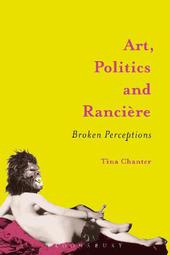
|
Art, Politics and Ranciere: Broken Perceptions
Hardback
Main Details
| Title |
Art, Politics and Ranciere: Broken Perceptions
|
| Authors and Contributors |
By (author) Tina Chanter
|
| Physical Properties |
| Format:Hardback | | Pages:200 | | Dimensions(mm): Height 234,Width 156 |
|
| Category/Genre | Philosophy - aesthetics |
|---|
| ISBN/Barcode |
9781472510563
|
| Classifications | Dewey:111.85 |
|---|
| Audience | | Tertiary Education (US: College) | |
|---|
| Illustrations |
2 b/w illustrations
|
|
Publishing Details |
| Publisher |
Bloomsbury Publishing PLC
|
| Imprint |
Bloomsbury Academic
|
| Publication Date |
14 December 2017 |
| Publication Country |
United Kingdom
|
Description
Even those who take themselves to be breaking from tradition-from the metaphysical tradition of philosophy, from grand narratives, neoliberalism or Eurocentrism-can remain blindly attached to them. Art, Politics and Ranciere: Broken Perspectives provides an account of how works of art can, but do not necessarily, interrupt dominant narratives. Inspired by Jacques Ranciere, Tina Chanter assumes his work as a starting point. She presents a rigorous and appreciative critique of Ranciere's story of aesthetics, paying close attention to gender and race. Along with the relationship between the unconscious and the political, perception is a key theme throughout, used to address questions such as 'How do some things become visible, while other things remain invisible?' 'What does it take for something to be seen, and why do other things elude visibility?' Alongside illuminating discussions of Ranciere, Heidegger and Levinas are informed accounts of artists Ingrid Mwangi, Phillip Noyce, Ingrid Pollard, and Gillian Wearing. Outlining the basis of a new political aesthetic, Art, Politics and Ranciere develops an original philosophical consideration that is sensitive to race and gender, yet not reducible to these concerns.
Author Biography
Tina Chanter is Professor of Philosophy and Gender at Kingston University, UK.
ReviewsTina Chanter appreciates like no other thinker that for Ranciere, aesthetics and politics are inseparable. In this learned study she unravels the political powers of perceptibility and imperceptibility, and astutely articulates the modernist aesthetic sensibilities at the heart of Ranciere's democratic politics. In short, this book is a welcome and needed addendum to those interpretations of Ranciere's work that disregard the political power of the aesthetic and the aesthetic power of politics. -- Davide Panagia, Associate Professor, UCLA, USA. In this beautifully written book, Tina Chanter gives a compelling and critical outline of Jacques Ranciere's conjunction between art and politics. She is particularly impressive in filling out some of the details missing from his selective references to the history of philosophy on topics like tyranny and slavery. Chanter's driving contention is that Ranciere does not adequately address the questions at the core of feminist politics. From this premise, she takes his ideas in new directions, some of them antithetical to his most cherished positions. The result is a stimulating and provocative work that draws Ranciere's thought into new arenas and debates. -- Alison Ross, Associate Professor of Philosophy, Monash University, Australia. Providing a philosophically expansive understanding of Ranciere's views of the interweaving of aesthetics and politics, Tina Chanter deftly distills his recasting of major ideas, such as those about the relation between art and life, the hierarchy of form and matter, and the Kantian aesthetic community. She luminously traces how Ranciere both looks into and runs away from gender, race, and coloniality. By reading him alongside contemporary feminist art, she persuasively shows how we nonetheless can at once insist-with Ranciere-on the potentialities of dissensus as central to politics and artistic critique, and hold assumptions of equality to the standards they champion. -- Monique Roelofs, Professor of Philosophy, Hampshire College, USA. In Art, Politics, and Ranciere Tina Chanter offers at once a brilliant analysis of Ranciere's work and weaves a compelling feminist counter-narrative to his logic of dissensus, sensibility, and social protest. In so doing she shows how aesthetic and political distributions and redistributions of the sensible are invariably gendered and radicalized in ways that resist easy equivalence or subsumption under the category of class, or under a too abstract notion of "a part that has no part." A key contribution to philosophical and feminist debates about aesthetics, art, and politics. -- Ewa Plonowska Ziarek, Buffalo University, USA
|